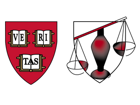Posts filed under 'Intellectual Property'
Joe Karaganis discusses findings from a forthcoming six-country study of media piracy, including work on Russia, India, Brazil, Mexico, and South Africa. The study provides a rare empirical look at the organization of piracy and enforcement in developing countries, and explores the transformation of both as the optical disk economy give way to digital distribution.
 Download the MP3
Download the MP3
…or download the OGG audio format!
February 3rd, 2010
Joe Karaganis discusses findings from a forthcoming six-country study of media piracy, including work on Russia, India, Brazil, Mexico, and South Africa. The study provides a rare empirical look at the organization of piracy and enforcement in developing countries, and explores the transformation of both as the optical disk economy give way to digital distribution.

Click Above for Video…or download the OGG video format!
February 3rd, 2010
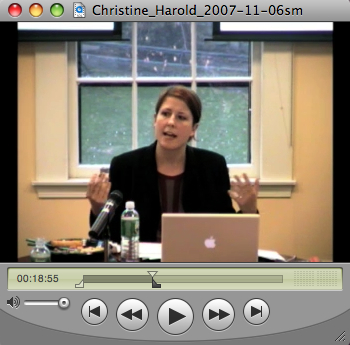
QuickTime Video
Christine Harold, an Assistant Professor in Department of Communication at the University of Washington, was the guest speaker this week at the Berkman Center’s Luncheon Series.
Harold’s presentation, entitled “Inventing Publics: Kairos and Intellectual Property Law” looks to explore the possibilities of the “open content” movement, specifically the licensing model offered by Creative Commons, as a productive alternative to other prevalent responses to the corporate hoarding of cultural resources.
As she argues in her recent book OurSpace: Resisting the Corporate Control of Culture, rather than engaging commercial culture dialectically, an open content approach serves as a provocation to commercialism by amplifying certain market logics and, in doing so, undermines concepts such as “author” and “property” on which corporate power depends.
Runtime: 54:31, size: 320×240, 157.3MB, .MOV, H.264 codec
November 9th, 2007
 Christine Harold, ries features Christine Harold, an Assistant Professor in Department of Communication at the University of Washington, was the guest speaker this week at the Berkman Center’s Luncheon Series.
Christine Harold, ries features Christine Harold, an Assistant Professor in Department of Communication at the University of Washington, was the guest speaker this week at the Berkman Center’s Luncheon Series.
 Download the MP3 (time: 54:04)
Download the MP3 (time: 54:04)
Harold’s presentation, entitled “Inventing Publics: Kairos and Intellectual Property Law” looks to explore the possibilities of the “open content” movement, specifically the licensing model offered by Creative Commons, as a productive alternative to other prevalent responses to the corporate hoarding of cultural resources.
As she argues in her recent book OurSpace: Resisting the Corporate Control of Culture, rather than engaging commercial culture dialectically, an open content approach serves as a provocation to commercialism by amplifying certain market logics and, in doing so, undermines concepts such as “author” and “property” on which corporate power depends.
November 6th, 2007
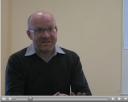 When Viacom filed a $1 billion lawsuit against YouTube – and its parent company Google – this past March, it sent shockwaves across the Internet. Where would the liability fall when copyrighted materials were posted on user-generated sites? Would the status quo of cease-and-desist notices be enough to keep sites such as YouTube out of hot water?
When Viacom filed a $1 billion lawsuit against YouTube – and its parent company Google – this past March, it sent shockwaves across the Internet. Where would the liability fall when copyrighted materials were posted on user-generated sites? Would the status quo of cease-and-desist notices be enough to keep sites such as YouTube out of hot water?
The broader debate over the interests of copyright versus “fair use” has continued through a number of discussions since this case came to the forefront, with both sides taking paths they feel are most effective. Whether it’s the RIAA pursuing illegal downloads on college campuses or documentary filmmakers establishing best practices for fair use, the debate has been a lively one.
This week’s episode of Berkman.TV features Andrew McLaughlin who, in addition to being a Fellow Emeritus of the Berkman Center, is also the Director of Global Public Policy for Google. Andrew does a great job of addressing the breadth of challenges involved in the conflict and explains Google’s latest solution to the problem. Tune in and enjoy!
October 24th, 2007
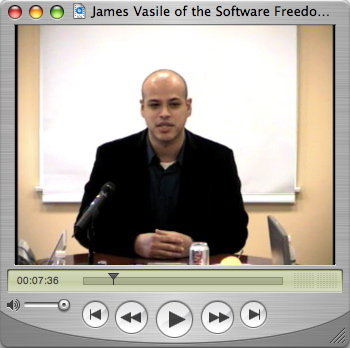
QuickTime Video
This past Tuesday, the Berkman Luncheon Series continued with a presentation and discussion by James Vasile of the Software Freedom Law Center.
James is Counsel for the center, which seeks to “provide legal representation and other law-related services to protect and advance free software.” In addition to his vast experience in a range of new media related cases, James has also contributed code and documentation to numerous FOSS software projects.
Runtime: 50:30, size: 320×240, 142MB, .MOV, H.264 codec
October 5th, 2007

QuickTime Video
Not too long ago, a student was escorted out of the Harvard University Bookstore (The Coop) for copying ISBNs from course materials only available at that store. The Coop claimed that the student was infringing on their “intellectual property,” because they were going to be used on the Crimson Reading website, which allows students to compare prices of course materials available online.
Clinical student Angela Kang and the Berkman Center’s John Palfrey and Wendy Seltzer joined together in noting the unfounded claims of The Coop in a recent Op-Ed published by The Harvard Crimson:
We’re not sure what “intellectual property” right the Coop has in mind, but it’s none that we recognize. Nor is it one that promotes the progress of science and useful arts, as copyright is intended to do. While intellectual property may have become the fashionable threat of late, even in the wake of the Recording Industry Association of America’s mass litigation campaign the catch-phrase—and the law—has its limits.
Now Berkman TV, the new video production channel from the Berkman Center, has an episode featuring Angela and Wendy, as they elaborate on this argument and the trends in intellectual property claims. Visit MediaBerkman for this episode of Berkman TV and the many more to come!
About
Berkman.tv is a frequently produced video segment on internet-related news and hot button issues with comments from Berkman fellows, faculty, and friends. Berkman.tv will explore a broad spectrum of issues, including, but not limited to, the future of the internet, copyright, net neutrality, intellectual property, public radio, and more. Keep an eye out on this space for more informed commentary from the Berkman Center for Internet & Society at Harvard Law School.
October 4th, 2007

Yesterday, the Berkman Luncheon Series continued with a presentation and discussion by James Vasile of the Software Freedom Law Center.
 Download the MP3 (time: 50:14)
Download the MP3 (time: 50:14)
James is Counsel for the center, which seeks to “provide legal representation and other law-related services to protect and advance free software.” In addition to his vast experience in a range of new media related cases, James has also contributed code and documentation to numerous FOSS software projects.
October 3rd, 2007
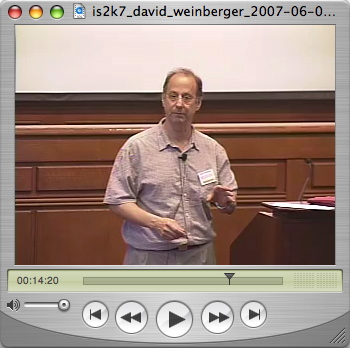
QuickTime Video
David Weinberger, Research Fellow at the Berkman Center for Internet & Society and author of the new book Everything is Miscellaneous, offers some final words at Internet & Society 2007 on June 1.
Runtime: 19:32, size: 320×240, 55MB, .MOV, H.264 codec
June 17th, 2007
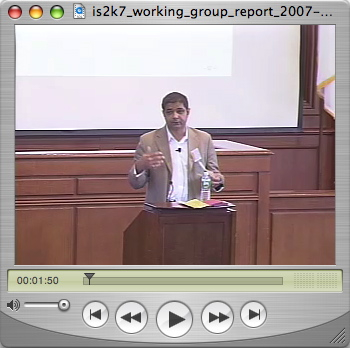
QuickTime Video
Harvard Business School Professor and Berkman Center Faculty Fellow, Karim Lakhani leads the Working Group Report and Action Plan afternoon session at Internet & Society 2007 on June 1.
Runtime: 56:21, size: 320×240, 157MB, .MOV, H.264 codec
June 17th, 2007
Previous Posts
Meta
License

Unless otherwise noted this site and its contents are licensed under a Creative Commons Attribution 3.0 Unported license.
![]() Download the MP3
Download the MP3

 Christine Harold, ries features Christine Harold, an Assistant Professor in Department of Communication at the University of Washington, was the guest speaker this week at the
Christine Harold, ries features Christine Harold, an Assistant Professor in Department of Communication at the University of Washington, was the guest speaker this week at the 





